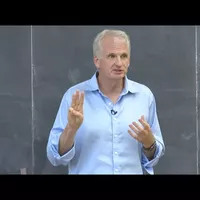Class 7. Rise of Muscovite Power (5)
So the global part of this is that Russia
is entering the global economy on the Atlantic side
and on the Pacific side at about the same time.
So the way that this works in practice, very quickly,
is that the territory, once the Kazan Khanate
has been defeated, this territory is open.
The Muscovites move in.
The people that they send are called Kazakhs,
and a Kazakh is basically a free person.
We'll talk more about them.
The Kazakhs go and they conquer,
with the help of European weapons.
This is also a globalized element of this,
and it's why Russia is part of the European
age of discovery, if you like, at this point.
They're using muskets, they're using gun powder weapons,
and that's one of the reasons why they're so successful.
They find lots of people who they can oppress
and collect tribute from in the form of beaver
and black fox, and especially sable pelts,
which are enormously profitable at the time.
They get their way across, they move across all of Siberia.
Very quickly, the first expedition to the Pacific
is in 1639.
A man called Semyon Dezhnev crosses the Bering Strait.
That is, he reaches North America, in 1647.
So in a very, very short period of time,
a huge amount of territory, right?
An eighth, a ninth of the Earth's surface
is now under control of Moscow.
And that's not just a matter of territory,
it's also a matter of human variety.
There are roughly 500 groups in this territory,
speaking roughly 120 languages.
And many of these groups still exist,
and you can read about them in the news
as they're being mobilized to fight in Ukraine.
But it's also, as I've tried to stress,
it's globalization, because Russia is trading
the Atlantic and the Pacific at the same time.
And finally, this is the very last sentence, with China.
So one of the limits, one of the few limits that Russia,
that Moscow reaches is with the Chinese.
They reach, they sign a peace treaty with China
in 1689 in Nerchinsk, which establishes the border
between Muscovy and China.
But more importantly, it establishes terms of trade
between Muscovy and China so that all those furs
can be traded to China for luxury goods.
So the route to China, which the English
were trying to discover, eventually does take place,
but by way of land rather than by way of sea.
So this is the origins of Muscovite power.
A new system, an enormous amount of new territory,
and the success of centralization in all of this.
What this has to do with all of Rus', of course,
you know, is very fuzzy.
If I've gotten anything across, I hope it's this,
that Rus' has many successors,
and we wouldn't want deny the connection
between Rus' to Galicia-Volhynia, or to Lithuania,
or at the state that's founded in Moscow.
But Moscow also has very much to do with the Mongol period,
which lasts for so very much longer there than elsewhere.
And it has very much to do with the fact
that its first moves when it comes into existence,
are territorial expansion to Europe, but mostly into Asia.
Okay, thank you very much.
(bright chiming music)

